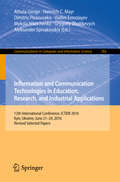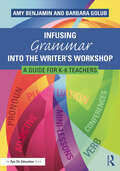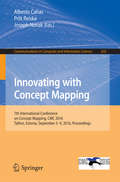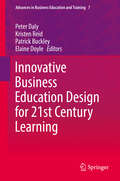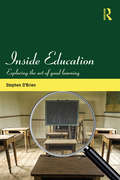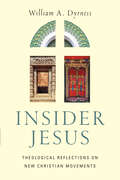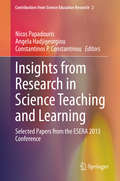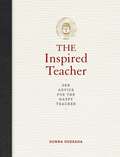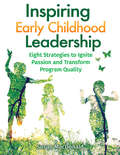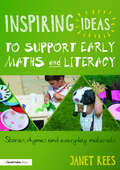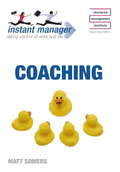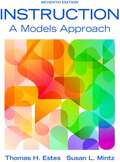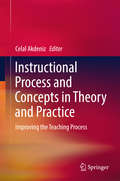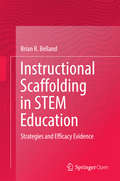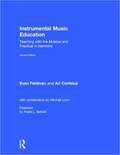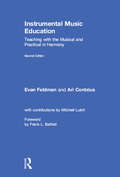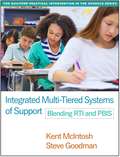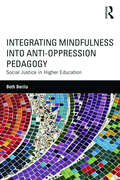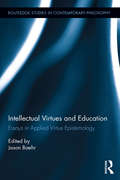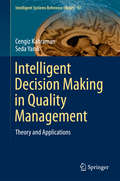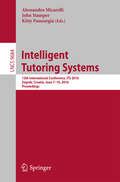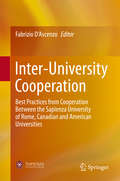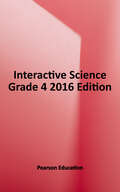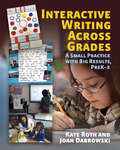- Table View
- List View
Information and Communication Technologies in Education, Research, and Industrial Applications
by Heinrich C. Mayr Mykola Nikitchenko Grygoriy Zholtkevych Vadim Ermolayev Athula Ginige Dimitris Plexousakis Aleksander SpivakovskiyThis book constitutes the thoroughly refereed proceedings of the 11th International Conference on Information and Communication Technologies in Education, Research, and Industrial Applications, ICTERI 2015, held in Lviv, Ukraine, in May 2015. The 9 revised full papers presented were carefully reviewed and selected from 119 submissions. The papers are grouped into two parts: ICT in education and industrial applications, and formal frameworks.
Infusing Grammar Into the Writer's Workshop: A Guide for K-6 Teachers
by Amy Benjamin Barbara GolubHelp your students improve their language skills and become stronger readers and writers. In this timely book, literacy experts Amy Benjamin and Barbara Golub offer best practices for fortifying the writer’s workshop model with meaningful, relevant instruction in grammar. The book answers questions such as… What does a writer’s workshop look like and how does it fit into balanced literacy models? How does grammar fit into a writer’s workshop? How can you use natural language acquisition to transition children from non-Standard to Standard English patterns? How can you teach students to identify a complete sentence? What are effective ways to teach parts of speech? How can you build on nouns and verbs to teach adjectives, adverbs, prepositional phrases, and dependent clauses? In each chapter, you’ll find out exactly what teaching the targeted concept looks like in a workshop classroom. Examples are provided for different grade levels and can be adapted as necessary to meet your needs. This book is a No-Worksheet Zone. You’ll learnhow to present grammar using authentic text and talk, leading to more durable learning.
Innovating with Concept Mapping
by Alberto Cañas Priit Reiska Joseph NovakThis book constitutes the refereed proceedings of the 7th International Conference on Concept Mapping, CMC 2016, held in Tallinn, Estonia, in September 2016. The 25 revised full papers presented were carefully reviewed and selected from 135 submissions. The papers address issues such as facilitation of learning; eliciting, capturing, archiving, and using expert knowledge; planning instruction; assessment of deep understandings; research planning; collaborative knowledge modeling; creation of knowledge portfolios; curriculum design; eLearning, and administrative and strategic planning and monitoring. "
Innovative Business Education Design for 21st Century Learning
by Patrick Buckley Peter Daly Kristen Reid Elaine DoyleThis volume explores two aspects of change within higher education: macro factors governing and influencing the institutional environment, and micro issues taking place within the institutions themselves. The first part of the book examines some of the micro issues that influence business and economics pedagogy. It presents reflections and analyses of teaching roles and values, the enhancement of the student learning experience with technology and real world experiences, and what students want and need to learn. The second part of the book looks at the wider institutional environment of change - the shifts in values, new stakeholders, and a change of focus toward developing skills students need to succeed in business. The book highlights the inter-related nature of these changes and shows that both aspects are important in motivating and inspiring students to be able participants in a 21st century global society. Its focus on interdisciplinarity, curriculum structures, and changing stakeholders helps to analyse the roles and models of business and economics education in addressing the needs of today's global environment.
Inside Education: Exploring the art of good learning
by Stephen O'BrienTo learn more about learning – what it is and how it works – it is necessary to look inside education. Inside Education takes the reader on a journey of four ‘live’ education projects: the first all-Irish speaking, mixed-gendered, multi-faith primary school in the Republic of Ireland ideally suited to exploring learning identity; an alternative post-primary school for those who leave (or are left behind by) the formal education system also based in the Republic of Ireland and ideally suited to exploring personal learning; an early college school that enables students to simultaneously sit their high-school diploma and college exams based in Queens, New York and ideally suited to exploring learning success; and an adult education training centre that works with ‘landless’ movement members based in Brazil and ideally suited to exploring learning power. <P><P>Using a critical ethnography approach, each research narrative naturally unfolds/enfolds to tell a more complete learning story. All those interested in education are primed readers. By (re-)viewing their own learning outlook, they may begin to advance deeper critical ideas and debates in education. They may come to (re-)represent education, reminding public consciousness of its human stories, as well as its curious, intricate and powerful qualities. And they may (re-)discover ‘other’ roads to raise a scholar. Teachers, educational researchers, parents and guardians will be particularly interested readers.
Inside Graduate Admissions: Merit, Diversity, and Faculty Gatekeeping
by Julie R. PosseltAdvanced degrees are necessary for careers that once required only a college education. Yet little has been written about who gets into grad school and why. Julie Posselt pulls back the curtain on this secret process, revealing how faculty evaluate applicants in top-ranked doctoral programs in the humanities, social sciences, and natural sciences.
Insider Jesus: Theological Reflections on New Christian Movements
by William A. DyrnessChristianity Today's 2017 Book of the Year Award of Merit - Missions/Global Church
Insights from Research in Science Teaching and Learning
by Nicos Papadouris Angela Hadjigeorgiou Constantinos P. ConstantinouThis book includes studies that represent the state of the art in science education research and convey a sense of the variation in educational traditions around the world. The papers are organized into six main sections: science teaching processes, conceptual understanding, reasoning strategies, early years science education, and affective and social aspects of science teaching and learning. The volume features 18 papers, selected from the most outstanding papers presented during the 10th European Science Education Research Association (ESERA) Conference, held in Nicosia, Cyprus, in September 2013. The theme of the conference was "Science Education Research for Evidence-based Teaching and Coherence in Learning". The studies presented underline aspects of great relevance in contemporary science education: the need to reflect on different approaches to enhance our knowledge of learning processes and the role of context, designed or circumstantial, formal or non-formal, in learning and instruction. These studies are innovative in the issues they explore, the methods they use, or the ways in which emergent knowledge in the field is represented. The book is of interest to science educators and science education researchers with a commitment to evidence informed teaching and learning.
Inspired Teacher: Zen Advice for the Happy Teacher
by Donna QuesadaDonna Quesada had been teaching for about a dozen years when the first signs of burnout hit her. Rather than give in to her frustration, she reached for Buddha’s teachings, the Zen wisdom that formed the basis of her own longtime spiritual practice. She survived the semester and gradually rediscovered the joy in her job that had been progressively declining. In this wise and inspirational book, she shares the lessons she learned--lessons that revealed, time and again, that no matter the situation, it’s always about getting your head in the right place first. Resolution begins in our own minds. Some days, some semesters, and even some years will be more challenging and more wearisome than others, she warns. But in The Inspired Teacher, Quesada offers a lasting source of encouragement and Zen. Although the book draws from Eastern teachings, the wisdom is for everyone, regardless of personal background, creed, or faith. With elements of The Last Lecture as well as Chicken Soup for the Teacher’s Soul, this is the perfect gift for teachers--but also for anyone needing inspiration.
Inspiring Early Childhood Leadership: Eight Strategies to Ignite Passion and Transform Program Quality
by Susan MacdonaldA positive, strengths-based leadership system is the key to transforming the quality of early childhood programs. Inspiring Early Childhood Leadership lays out strategies designed to support program leaders in finding new ways to reduce the levels of stress on themselves and their staff, and move into a unified, engaging system for leading with passion, intention, and purpose. Grounded in current research, the book incorporates decades-old best practices, making the strategies appropriate for leaders of all backgrounds. The book addresses common dilemmas: How do I motivate and inspire teachers? How can I be the most effective in observing and giving nonjudgmental feedback? How can I be more confident in my role as a leader? How can I manage my time more effectively? Author Susan MacDonald's goal is to take leaders past their challenges with a vision of new possibilities so they can ensure a high-quality learning environments, fueled by positive, engaging energy. - See more at: https://www.gryphonhouse.com/books/details/inspiring-early-childhood-leadership#sthash.1C3Jk9kO.dpuf
Inspiring Ideas to Support Early Maths and Literacy: Stories, rhymes and everyday materials
by Janet ReesInspiring Ideas to Support Early Maths and Literacy takes a play-based approach and draws on popular stories and rhymes to cover the key areas of mathematics and literacy. Full of practical, tried and tested ideas for developing understanding in mathematics and literacy, this book aims to help practitioners make these areas of learning exciting and meaningful for young children. Each chapter shows how learning can be reinforced and brought to life through resources made from everyday materials, providing children with an enjoyable and positive learning experience. Key features include: • clear instructions and full colour photographs on how to make practical resources for indoor and outdoor environments • vocabulary lists for inspiration and ideas for developing a new play space or overhauling an existing space • key questions to consider when planning and designing an indoor or outdoor play space • links to the Early Years Foundation Stage that will guide the development of a future playground and challenge providers to enhance their practice. This practical resource will be essential reading for primary teachers, early years practitioners, students and all those interested in developing young children’s confidence in mathematics and literacy. .
Instant Manager: Coaching
by Matt SomersWhether you are finding your way as a manager or you want to enhance the skills you already have, the Instant Manager series is exactly what you need! Written by leading experts, they are inexpensive, concise but above all authoritative guides to the subject at hand. Based on the 10 most FAQs, each chapter ends with a quick tip that can be taken on board immediately. A tear out card covering the most salient points allows you to carry the expertise with you wherever you go. 'Coaching' covers all of the areas of this hot topic that you will need, including a basic explanation of what coaching is, what it can do and what skills a manager needs to be a good coach. It includes advice on how to motivate individuals and groups and gives practical examples of coaching in action.
Instruction: A Models Approach , Seventh Edition
by Thomas H. Estes Susan L. MintzPre-service, beginning, and experienced teachers alike can turn to this comprehensive resource for help in expanding their instructional repertoires through instructional models presented within a standards-based and instructionally aligned process. The authors present 10 evidence-based instructional models and their variations offering a range of cognitive approaches to instruction creative, compliant, collaborative, competitive, inductive, deductive, concrete, and abstract. Each model is discussed using helpful elementary and secondary examples, a variety of academic content areas, detailed steps for implementation, and a look at the demands on students. The new edition of Instruction: A Models Approach includes several features that support the development of instructional skills: chapters move from concrete models to abstract (simple to more complex) to build a clearer understanding of the ideas, video examples, and instructional strategies illustrate the concepts, and extension activities offer practice with important new information and skills. The result is a classroom-ready resource that makes instructional models clear and relevant for readers within a standards-based and instructionally aligned process. The Enhanced Pearson eText features embedded video and internet resources.
Instructional Process and Concepts in Theory and Practice: Improving the Teaching Process
by Celal AkdenizThis book offers an accessible, practical and engaging guide that provides sample instructional activities supported by theoretical background information, with a focus on the nature of the instructional process in relation to several variables. It approaches instructional models, strategies, methods, techniques, tactics and planning from a new perspective and shares effective tips to help readers better understand the instructional process and its theoretical elements. The book addresses the following questions:What is the nature of the instructional process?What are the classifications of contemporary models and strategies developed within the instructional process?Which groups yield the most effective methods and techniques, and how can they best be practically implemented?What are the instructional tactics teachers need to take into consideration, in which groups are they collected, and which tips can help us employ each tactic?Additionally, readers can adapt the book’s ready-to-use sample activities to their own educational settings. Overall, this book offers an enlightening discussion on contemporary practices related to the teaching process, a broad and holistic theoretical framework, and an ideal reference source for all students and scholars who are interested in the educational sciences.
Instructional Scaffolding in STEM Education
by Brian R. BellandThis book uses meta-analysis to synthesize research on scaffolding and scaffolding-related interventions in STEM (science, technology, engineering, and mathematics) education. Specifically, the volume examines the extent to which study quality, assessment type, and scaffolding characteristics (strategy, intended outcome, fading schedule, scaffolding intervention, and paired intervention) influence cognitive student outcomes. It includes detailed descriptions of the theoretical foundations of scaffolding, scaffolding strategies that have been proposed to meet different intended learning outcomes in STEM, and associated efficacy information. Furthermore, the book describes assessment strategies and study designs which can be used to evaluate the influence of scaffolding, and suggests new fields in which scaffolding strategies that have proven efficacious may be used.
Instrumental Music Education: Teaching with the Musical and Practical in Harmony
by Evan Feldman Ari Contzius<p>Instrumental Music Education: Teaching with the Musical and Practical in Harmony, 2nd Edition is intended for college instrumental music education majors studying to be band and orchestra directors at the elementary, middle school, and high school levels. This textbook presents a research-based look at the topics vital to running a successful instrumental music program, while balancing musical, theoretical, and practical approaches. A central theme is the compelling parallel between language and music, including "sound-to-symbol" pedagogies. Understanding this connection improves the teaching of melody, rhythm, composition, and improvisation. <p>The companion website contains over 120 pedagogy videos for wind, string, and percussion instruments, performed by professional players and teachers, over 50 rehearsal videos, rhythm flashcards, and two additional chapters, "The Rehearsal Toolkit," and "Job Search and Interview." It also includes over 50 tracks of acoustically pure drones and demonstration exercises for use in rehearsals, sectionals and lessons.</p>
Instrumental Music Education: Teaching with the Musical and Practical in Harmony (Second Edition)
by Evan Feldman Ari Contzius Mitchell Lutch<p>Instrumental Music Education: Teaching with the Musical and Practical in Harmony, 2nd Edition is intended for college instrumental music education majors studying to be band and orchestra directors at the elementary, middle school, and high school levels. This textbook presents a research-based look at the topics vital to running a successful instrumental music program, while balancing musical, theoretical, and practical approaches. A central theme is the compelling parallel between language and music, including "sound-to-symbol" pedagogies. Understanding this connection improves the teaching of melody, rhythm, composition, and improvisation. <p>The companion website contains over 120 pedagogy videos for wind, string, and percussion instruments, performed by professional players and teachers, over 50 rehearsal videos, rhythm flashcards, and two additional chapters, "The Rehearsal Toolkit," and "Job Search and Interview." It also includes over 50 tracks of acoustically pure drones and demonstration exercises for use in rehearsals, sectionals and lessons. <p>New to this edition: <p> <li> Alternative, non-traditional ensembles: How to offer culturally relevant opportunities for more students, including mariachi, African drumming, and steel pans. <li> More learning and assessment strategies <li> The science of learning and practicing: How the brain acquires information <li> The philosophies of Orff and El Sistema, along with the existing ones on Kodály, Suzuki, and Gordon. <li> The Double Pyramid of Balance: Francis McBeth’s classic system for using good balance to influence tone and pitch. <li> Updated information about copyright for the digital age</li> </p>
Integrated Multi-Tiered Systems Of Support: Blending Rti And Pbis (The Guilford Practical Intervention In The Schools)
by Steve Goodman Kent McIntoshMany schools have implemented academic response to intervention (RTI) and schoolwide positive behavioral interventions and supports (PBIS) as separate initiatives. This book provides keys to making these programs more effective, seamless, efficient, and sustainable by combining them into a single multi-tiered system of support (MTSS). Steps and strategies are outlined for integrating data structures, practices, teams, and district systems. Contributing authors present detailed case examples of successful MTSS implementation in three states. In a large-size format with lay-flat binding, the book features 27 reproducible checklists and evaluation tools. Purchasers get access to a companion website where they can download and print the reproducible materials plus other helpful resources. <p><p> This book is in The Guilford Practical Intervention in the Schools Series, edited by T. Chris Riley-Tillman.
Integrating Mindfulness into Anti-Oppression Pedagogy: Social Justice in Higher Education
by Beth BerilaDrawing from mindfulness education and social justice teaching, this book explores an anti-oppressive pedagogy for university and college classrooms. Authentic classroom discussions about oppression and diversity can be difficult; a mindful approach allows students to explore their experiences with compassion and to engage in critical inquiry to confront their deeply held beliefs and value systems. This engaging book is full of practical tips for deepening learning, addressing challenging situations, and providing mindfulness practices in anti-oppression classrooms. Integrating Mindfulness into Anti-Oppression Pedagogy is for all higher education professionals interested in pedagogy that empowers and engages students in the complex unlearning of oppression.
Intellectual Virtues and Education: Essays in Applied Virtue Epistemology (Routledge Studies in Contemporary Philosophy)
by Jason BaehrWith its focus on intellectual virtues and their role in the acquisition and transmission of knowledge and related epistemic goods, virtue epistemology provides a rich set of tools for educational theory and practice. In particular, characteristics under the rubric of "responsibilist" virtue epistemology, like curiosity, open-mindedness, attentiveness, intellectual courage, and intellectual tenacity, can help educators and students define and attain certain worthy but nebulous educational goals like a love of learning, lifelong learning, and critical thinking. This volume is devoted to exploring the intersection between virtue epistemology and education. It assembles leading virtue epistemologists and philosophers of education to address such questions as: Which virtues are most essential to education? How exactly should these virtues be understood? How is the goal of intellectual character growth related to other educational goals, for example, to critical thinking and knowledge-acquisition? What are the "best practices" for achieving this goal? Can growth in intellectual virtues be measured? The chapters are a prime example of "applied epistemology" and promise to be a seminal contribution to an area of research that is rapidly gaining attention within epistemology and beyond.
Intelligent Decision Making in Quality Management
by Cengiz Kahraman Seda YanıkThis book presents recently developed intelligent techniques with applications and theory in the area of quality management. The involved applications of intelligence include techniques such as fuzzy sets, neural networks, genetic algorithms, etc. The book consists of classical quality management topics dealing with intelligent techniques for solving the complex quality management problems. The book will serve as an excellent reference for quality managers, researchers, lecturers and postgraduate students in this area. The authors of the chapters are well-known researchers in the area of quality management.
Intelligent Tutoring Systems
by Alessandro Micarelli John Stamper Kitty PanourgiaThis book constitutes the refereed proceedings of the 13th International Conference on Intelligent Tutoring Systems, ITS 2016, held in Zagreb, Croatia, in June 2016. The 20 revised full papers, 32 short papers, 35 posters, and 7 young researchers' track papers presented in this volume were carefully reviewed and selected from 147 submissions. The specific theme of the ITS 2016 conference is "Adaptive Learning in Real World Contexts". ITS 2016 covers a wide range of topics such as: intelligent tutoring; informal learning environments, learning as a side effect of interactions; collaborative and group learning, communities of practice and social networks; simulation-based learning and serious games; dialogue and discourse during learning interactions; co-adaptation between technologies and human learning; ubiquitous and mobile learning environments; empirical studies of learning with technologies, understanding human learning on the web; adaptive support for learning, models of learners, diagnosis and feedback; modeling of motivation, metacognition, and affect aspects of learning; recommender systems for learning; virtual pedagogical agents and learning companions; ontological modeling, semantic web technologies and standards for learning; multi-agent and service oriented architectures for learning and tutoring environments; educational exploitation of data mining and machine learning techniques; instructional design principles or design patterns for educational environments; authoring tools and development methodologies for advanced learning technologies; domain-specific learning technologies, e. g. language, mathematics, reading, science, medicine, military, and industry; non conventional interactions between artificial intelligence and human learning; and privacy and security in e-learning environments.
Inter-University Cooperation
by Fabrizio D'AscenzoInter-university cooperation across the world has shown several positive outcomes in terms of knowledge exchange as well as R&D benefits. This book portrays best practices of inter-university cooperation between Italian and American universities, while featuring agreements of Sapienza University of Rome. This book presents conceptual and implementation specifics of cooperation, policy perspectives, as well as a selection of framework agreements of current cooperation initiatives. Aimed at university professors, education and R&D policy makers, this book shall prove worthy as a guideline to initiate and implement inter-university cooperation globally.
Interactive Science
by Pearson EducationBy combining new features with the proven approach of Interactive Science, this new digital update for Grades K-8 is correlated to the NGSS (Next Generation Science Standards) and will provide students with the tools to activate their inner scientist. <p><p>Interactive Science enables students aged 5-14 to connect to science concepts in a unique way that makes learning more personal, relevant and engaging. The program offers three pathways for learning and is fully flexible to fit alongside any curriculum. <p><p>The ©2016 update of Interactive Science focuses on an implementation of Problem-Based Learning, STEM, Performance Expectation activities and support for new standards while transitioning to a brand-new digital platform, Realize. The planning and development of Interactive Science was informed by the same foundational research as the NGSS Framework. Correlations can be found throughout the 2016 program. Find out more about the NGSS framework and how Pearson is supporting the transition.
Interactive Writing Across Grades: A Small Practice with Big Results
by Kate Roth Joan DabrowskiWhen done on a regular basis, interactive writing has the potential to improve independent writing. Authors Kate Roth and Joan Dabrowski detail how this systemic approach can be applied in Interactive Writing Across Grades: A Small Practice with Big Results, PreK-5.' Interactive writing harnesses the natural interactions teachers have with their students as they compose a writing piece. It allows for real-time differentiation and tailored scaffolding. This method fits within any basal writing curriculum and can be adapted to your classroom's technology levels. This book acts as a how-to guide that unpacks this powerful method, going step-by-step and grade-by-grade to figure out where and how interactive writing fits within your literacy framework. Inside you'll find:A complete overview of the interactive writing method and how it fits into your balanced literacy program Concrete ways to launch interactive writing in your classroom to support both process and craft instruction Step-by-step guidance to implement the method with students of all ages Student examples of writing from grades Pre-K through 5 to show what to expect at each phase of the process 'Listen in on a Lesson vignettes that demonstrate the type of scaffolding you can offer during interactive writing lessons Discover what makes interactive writing a particularly effective teaching practice that can support both emergent and fluent writers. Interactive Writing Across Grades can help put this method to work in the classroom immediately. '
